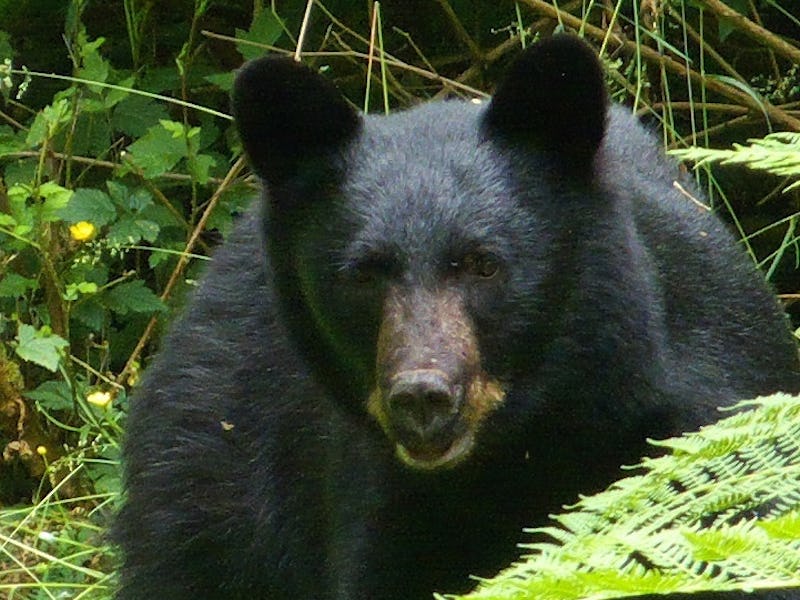What to Do When You Wake Up With Your Head Inside a Bear’s Mouth
When it comes to black bears, fight back.

At 3 a.m. Saturday morning, a Rocky Mountain black bear clenched a 19-year old’s head in its teeth and pulled the horrified teen from his sleeping bag. But the teen hit back and escaped the wild animal’s grip before it could crunch his skull. The violent encounter left the him with telltale scalp lacerations, but nothing remotely fatal, and he was up and speaking with the media that same day.
“The crunching noise, I guess, was the teeth scraping against the skull as it dug in,” the teen, named Dylan, told Denver’s KMGH. “It grabbed me like this and pulled me. Then it bit the back of my head and drug me.”
Bears are generally disinterested in people, so an unprovoked attack is rare, but they certainly occur. Sometimes runners or hikers will surprise bears, and a bear will react defensively. This response is logical — especially if it’s a sow with her cubs in tow. However, in this 3 a.m. instance, the bear’s motivations remain unknown and open to speculation. But what’s certain is that by fighting back against an aggressive black bear, the teen did the right thing.
Bear attacks are rare, but when they do happen, it’s important to respond differently to a black bear than you would a grizzly bear. The National Park Service provides thorough guidance on bear encounters and makes the crucial distinction between the two species. Typically you can just find out which type of bear country you’re in, but the differences are pretty easy to spot.
If you’re attacked by a grizzly bear, the Park Service recommends playing dead by laying flat on your stomach with your hands clenched over your neck and legs spread apart. Hopefully you’re wearing a backpack, too. According to experts at Yellowstone National Park, who have a rich history of studying grizzly bear encounters, 75 percent of grizzly bear attack victims that play dead walk away with only minor injuries. But those that fight back during “surprise encounters” with grizzlies are left with serious injuries 80 percent of the time.
Black bears, like the one that attacked the Colorado teen on Saturday, are a different story. Black bears will not relent, lose interest, or walk away from seemingly dead prey. If attacked, you must return the fight using any objects you have, and concentrate kicks and hits to the bear’s face. This, it appears, is precisely what the teen did.
Black bears -- which can come in all colors -- are forest bears. They're good climbers and smaller than grizzly bears. They have tall ears, unlike a grizzly's, which are short and rounded. Black bears also have a straight facial profile and no shoulder hump.
But usually, bear encounters don’t escalate so swiftly or at all, and as any prudent park ranger will tell you, there are known ways to avoid dangerous interactions with these mostly mild-mannered omnivores. The Park Service guidance above is the scientifically supported gold standard in bear etiquette, but in short, if a bear sees you, don’t react like a crazed madman. Move out of the way and calmly (as calm as you can) leave the area.
What attracted this particular black bear to a group of sleeping teens is unclear. The attack, fortunately, took place at a survival camp, so it’s unlikely they had food lying around. It may have been a juvenile “teenage” bear, perhaps three or four years old, who acted rashly when it stumbled upon the teen. At worst, it could have been a bear that had become habituated to humans, through improperly stored food or otherwise, and had little inhibition about approaching humans.
Regardless of its motivations, the aggressive bear will almost certainly be dead soon. Colorado Park and Wildlife officials have set traps in the area and will kill the animal. There is no curing a problem bear, even if the problem bear’s behavior, like attacking a campsite in search of food, was caused by humans.
In light of his harrowing encounter with the bear, the 19-year old victim seems keenly aware of how to behave responsibly in bear country, and recognizes that this skull-biting incident is not indicative of the creature’s usual behavior. They have better things to do than to bother with humans. We’re a poor, unfulfilling food source, anyway.
“I’m not afraid of the bears. I’m not afraid of sleeping outside anymore,” he said. “You just have to be aware and respect the animals.”